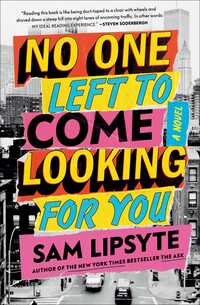No One Left to Come Looking for You by Sam Lipsyte
 Friday, December 2, 2022 at 4:43AM
Friday, December 2, 2022 at 4:43AM 
Published by Simon & Schuster on December 6, 2022
No One Left to Come Looking for You is a celebration of performance. The Shits perform music, or its rough equivalent, but the band members are also performing life. Their performance is hindered by crime, but in the end, nothing gets in the way of a good shriek.
Jonathan Liptak plays bass in a band called The Shits. Jonathan has decided he wants people to call him Jack, as in Jack Shit. That’s about as clever as Jack gets, which may be why Vesna broke up with him, although Jack attributes the breakup to his flake-outs and whiskey dick.
The Shits’ genre is “innovative and eccentric guitar-based noise rock,” which I take it means loud with no melody. A magazine described The Shits as “scabrous, intermittently witty, post-skronk propulsion not unlike early Anal Gnosis.” Another magazine praised its most recent seven-inch recording as “the most promising wedge of deconstructed neo-proto-art-scuzz since Gimp Mask Goethe’s notorious debut.” A fan named Corrina praises the band because it doesn’t care about all the bullshit, “like notes and stuff.”
Hera Benberger was The Shits’ drummer until she left to join Thorazine, an anemic band that isn’t loud at all. Hera comes from money, but Jack and the other band members are from middle-class suburbia. Craig Dunn (stage name Cutwolf) plays guitar. The band’s lead singer, Alan Massad (stage name Banished Earl), stole Jack’s guitar.
Jack assumes that the Earl will trade the guitar for drugs. Jack roams around in search of the Earl until a guitar shop owner tells him that a guy named Mounce is trying to sell the guitar. Jack tries to intervene, but Mounce is big and nasty while Jack is soft and pudgy.
The band has a gig coming up and stands to earn 13% of the $5 cover charge that maybe 25 people will pay to hear the band play. The gig is in jeopardy if Jack can’t find the Earl and his bass. Without the Earl’s vocals, the band is “a raucous, semi-coherent noise band.”
The plot follows Jack, who divides his time between aimlessly searching for the Earl and aimlessly living. One of those activities brings him into contact with a friend just after the friend is mortally wounded. A corrupt cop and Mounce make Jack wonder whether he will survive long enough to play what might be the band's final gig.
The story takes place in New York City during a week in 1993. Bill Clinton is the new President and Donald Trump isn’t paying his contractors, one of whom is the Earl’s father. Corruption is an urban menace that becomes instrumental to the plot. The band’s response to the abuse of power by the wealthy is reflected in its style: “post-wave neo-noise art punk with a sincere approach to anarchy.” The legendary band leader who mentored Jack fostered an ideology of “anarcho-bewildered” while teaching Jack to dislike law enforcement “insofar as its function is to protect the property of the rich and repress all resistance to the tyranny of the transactional order.”
No One Left to Come Looking for You is fun and funny. Sam Lipsyte’s edgy characters, plot, and prose capture a certain generational vibe that is echoed in the noise-music played by The Shits, music of the early 90s that built upon but rejected its roots. Music that purported to be about authenticity. It was, in fact, a performance of authenticity, meant to impress fans by sending the deliberate message that fans and performance were unimportant. Lipsyte exposes that hypocrisy without mocking the sincerity of the musicians who were trying to express something that they deemed to be important.
Jack’s only goal has been to move The Shits closer to, and possibly through, “the portal of depraved magnificence.” As the title suggests, Jack is a loner. Alienation is choice reflected in the band’s music and attitude (they don’t interact with each other or the audience while they perform, lest they allow impurities into their noise), but Jack comes to see other people like the stars in the New York City sky. You can only ever see two or three, but it’s good to know that others are out there. The novel drives toward that lesson in a fast and furious journey that, fortunately, is more coherent than the music Jack plays.
RECOMMENDED
Reader Comments